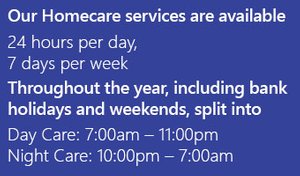Training
Induction training
Every new recruit is required to complete our induction training programme which equips them with the knowledge set out in the Skills for Care’s Common Induction Standards (CIS). This initial training also explains the values which govern the way in which London Care operates, as well as detailing the stringent safeguarding policies which ensure we place respect and dignity at the centre of our delivery. On completion of the CIS course, you will have a knowledge and understanding of the following aspects of the job:
Role of the health and social care worker
Personal development
Communicate effectively
Equality and Inclusion
Principles for implementing duty of care
Principles of safeguarding in health and social care
Person-centred support
Health and safety in an adult social care setting
Following induction, care workers spend time shadowing an experienced member of the team. This provides an opportunity to translate the lessons learned in your training to live situations and to pick up valuable insight on working with service users.
Even after your initial training, when you have the confidence and competence to work unsupervised, care workers can still access a network of support. Our operational and management teams in the branch, as well as other care workers on the ground, can always be called upon for advice and assistance.
Ongoing training
We are committed to working at the forefront of care delivery, which means ensuring our care workers are equipped with cutting edge skills. Regular refresher training provides the opportunity to learn new techniques and approaches that adhere to the latest industry practice as set out by NICE, SCIE and other specialist organisations.
All our careworkers are required to work towards their QCF Level 2 social care certificate, with some progressing onto level 3. In addition, we offer tailored training for care workers working with children or assigned to service users who have specialised care needs (e.g. dementia or end of life care).
For more information on industry recognised training standards, please visit the Skills for Care website:
http://www.theguardian.com/social-care-network/skills-for-care-partner-zone/adult-social-care-great-career
Care Certificate
- Understand your role
- Your personal development
- Duty of care
- Equality & Diversity
- Work in person cantered way
- Communication
- Privacy & Dignity
- Fluid & Nutrition
- Awareness of Mental Health & Dementia
- Safeguarding Adults
- Safeguarding Children
- Basic life support
- Health & Safety
- Handling information
- Infection prevention & control
- Medication
Additional training
- Annual Refresher course
- Moving & handling
- Pressure sore awareness
- Basic life Support &Emergency First Aid
- Understanding Autism & related conditions
- Dementia awareness
- Safeguarding principles adult, children & young people
- Strength base training
- Peg feeding awareness.
- Motor Neurone disease awareness
- Epilepsy awareness & seizure management
- Equity & diversity awareness
- Awareness of Food Hygiene safety and infection control
- Palliative care awareness
Other qualification
- Health and Social Care Level1
- Health Social Care Level2
- Health Social care Level3
- Medication Level 1,2




